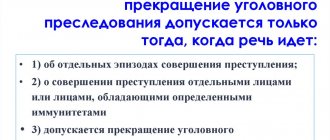New edition of Art. 239 Code of Criminal Procedure of the Russian Federation
1. In the cases provided for by paragraphs 3 - 6 of part one, part two of Article 24 and paragraphs 3 - 6 of part one of Article 27 of this Code, as well as in the event of a prosecutor’s refusal to charge in the manner established by part seven of Article 246 of this Code, the judge makes a resolution to terminate the criminal case.
2. A judge may also terminate a criminal case if there are grounds provided for in Articles 25 and 28 of this Code, at the request of one of the parties.
3. In a resolution to terminate a criminal case or criminal prosecution:
1) the grounds for termination of the criminal case and (or) criminal prosecution are indicated;
2) issues are resolved on the abolition of the preventive measure, as well as the seizure of property, correspondence, temporary removal from office, control and recording of negotiations;
3) the issue of material evidence is resolved.
4. A copy of the decision to terminate the criminal case is sent to the prosecutor, and is also handed to the person against whom the criminal prosecution has been terminated, and to the victim within 5 days from the date of its issuance.
5. If in a criminal case a decision was previously made on the use of security measures in the implementation of state protection, then the judge, simultaneously with the termination of the criminal case or criminal prosecution, makes a decision on the further application of security measures or on their complete or partial cancellation, if there are no security measures for the further application grounds provided for by the legislation of the Russian Federation, on the basis of information received from the body implementing security measures, or at the request of the body implementing security measures, or on the basis of a written application from the persons specified in Part 2 of Article 16 of Federal Law of August 20, 2004 N 119 -FZ “On State Protection of Victims, Witnesses and Other Participants in Criminal Proceedings”, which are subject to consideration within the established time frame. The body implementing security measures, as well as the person in respect of whom such a decision was made, is notified of the decision.
Grounds for termination of criminal proceedings and criminal prosecution
All bases can be divided into 3 large groups based on their function and features. Below we will examine separately which specific grounds are included in each of them.
Rehabilitative
This group includes those who, in one way or another, make it possible to restore a citizen’s lost reputation. These include the following:
- the event of the crime itself did not take place (no evidence was found that the offense occurred at all, or that it was caused by some natural phenomena. This also includes cases where the citizen caused harm to himself);
- there is no corpus delicti in the act itself (no signs of a criminal offense were found in the incident, or although it has some of them, it does not pose any serious public danger);
- the guilt of the citizen who was suspected of the crime was not proven (during the investigation it was discovered that at the time of the crime the person had an alibi or simply did not have sufficient evidence to reveal his guilt in the incident).
If there are rehabilitative grounds for terminating the criminal case, the court issues an acquittal, since these facts establish the complete innocence of the person in the incident.
Non-rehabilitative
These include only those in which the actual guilt of the criminal was proven, as well as the fact that the incident actually took place. These grounds mean:
- termination of a criminal case due to the expiration of the statute of limitations (they are calculated from the moment the crime itself was committed);
- in connection with the reconciliation of the parties (can be used only in relation to crimes of minor gravity, when the offender has reconciled with the victim and compensated for the damage caused to him in the amount established by the victim himself);
- change in the situation (a person committed a crime due to serious changes in his life - dismissal, death of a loved one, etc. Used only in relation to “light” offenses);
- release of the amnesty act;
- termination of a criminal case due to active repentance (this is a confession when a citizen agrees to take part in the investigation of the case and confesses to the committed act);
- correction of a person under the age of majority is possible without the use of punishment (if the teenager has committed a minor offense for the first time and only by decision of the investigator or prosecutor).
If there are non-rehabilitative grounds for termination of a criminal case, a citizen’s criminal record is not removed, and a note about this is kept in his personal file.
The third group includes the following grounds:
- termination of a criminal case due to the death of a citizen suspected of a crime;
- no signs of an offense were identified in the actions of the persons specified in paragraph 1 of Part 3–5 of Art. 448 Code of Criminal Procedure of the Russian Federation;
- there is a court or investigator order to terminate the case;
- the State Duma's refusal to grant consent to the deprivation of the president's immunity;
- a citizen has the right of diplomatic immunity.
Article 239 of the Code of Criminal Procedure of the Russian Federation. Termination of a criminal case or criminal prosecution (current version)
1. It seems that the judge at the preliminary hearing can dismiss the case on the grounds provided for in paragraphs 3 - 6, part 1, part 2 of Art. 24 and paragraphs 3 - 6, part 1, art. 27, as well as Art. Art. 25 - 26, 28. The absence of a crime at this stage of the process cannot serve as grounds for such termination (clause 1, part 1, article 24); absence of corpus delicti in the act (clause 2, part 1, article 24); non-involvement of the suspect or accused in the commission of a crime (clause 1, part 1, article 27). In these cases, an acquittal must be rendered, which requires a trial. In Part 1 of Art. 239 of the Code of Criminal Procedure also provides for the obligation of the court to terminate a criminal case on the grounds provided for in paragraphs 1 and 2 of part 1 of Art. 24 and paragraphs 1 and 2, part 1, art. 27, if the prosecutor abandoned the charge completely or in the relevant part (part 7 of article 246). However, the applicability of this norm already during the preliminary hearing is questionable, since according to the Resolution of the Constitutional Court of the Russian Federation, a court decision based on such a position of the public prosecutor is permissible only after completing a study of the relevant case materials and hearing the opinions of the participants in the court hearing on the part of the prosecution and defense. which is only conceivable at the trial stage. When a criminal case is terminated, as well as when proceedings on it are suspended, the judge at this stage has the right to evaluate evidence not only from the point of view of its admissibility, but also its relevance to the circumstances to be proven in the case, as well as reliability and sufficiency.
———————————
See: paragraph 3 of the Resolution of the Constitutional Court of the Russian Federation of December 8, 2003 N 18-P “In the case of verifying the constitutionality of the provisions of Art. Art. 125, 219, 227, 229, 236, 237, 239, 246, 254, 271, 378, 405 and 408, and ch. 35 and 39 of the Code of Criminal Procedure of the Russian Federation in connection with requests from courts of general jurisdiction and complaints from citizens” // RG. 12/23/2003.
In accordance with Part 2 of Art. 24 termination of a criminal case at a preliminary hearing is possible with decriminalization of the act, i.e. due to the absence of corpus delicti, when before the verdict entered into legal force, the criminality and punishability of this act were eliminated by a new criminal law. However, it is the judge's right to dismiss the case on this basis at the preliminary hearing. The court may also consider the merits of a criminal case pending before it if, before the verdict was pronounced, the criminality and punishability of the act charged to the accused was eliminated by the new criminal law. This does not deprive the accused of the right of access to justice and the right to effective judicial protection in the procedural forms established by law.
———————————
Determination of the Constitutional Court of the Russian Federation of November 5, 2004 N 361-O “On the complaint of gr. Filippov Vladimir Timofeevich for violation of his constitutional rights by part two of Art. 24, part four of Art. 133, art. 239 and paragraph 1 of Art. 254 Code of Criminal Procedure of the Russian Federation” // Bulletin of the Constitutional Court of the Russian Federation. 2005. N 2.
2. It seems that the judge has the right to terminate only the criminal case (including in a certain part of it), and not the criminal prosecution, because only the criminal prosecutor can terminate the prosecution.
———————————
On the fundamental possibility of partial termination of a criminal case in Russian criminal proceedings, see: paragraph 2, part 4, art. 163 Code of Criminal Procedure.
3. Termination of a criminal case is the only type of decision in which the judge at this stage has the right to evaluate evidence not only from the point of view of its admissibility, but also its relevance to the circumstances to be proven in the case, reliability and sufficiency. It seems that in this case, by analogy with Part 3 of Art. 235, during the preliminary hearing, the judge may question witnesses and attach to the case the necessary documents presented by the parties.
Comment source:
Ed. A.V. Smirnova “COMMENTARY ON THE CRIMINAL PROCEDURE CODE OF THE RUSSIAN FEDERATION” (ARTICLE BY ARTICLE), 5th edition
SMIRNOV A.V., KALINOVSKY K.B., 2009
Who can issue a termination order?
Termination of a criminal case due to reconciliation of the parties or for any other reasons is possible by order of the investigator or the court.
Important! Before applying this measure, the citizen in respect of whom it is used must be informed about this and the consequences that come with it. The procedure is also explained to the victim. After this, he has the right to appeal the decision to terminate the case within 5 days.
Copies of the decisions are sent to both parties.
Termination of proceedings is carried out in these processes even in cases where the application has just been received by the court. This can also be done during the trial itself. The procedure is carried out in the following cases:
- the case is not heard in these courts;
- there is already a previous court verdict on it;
- the plaintiff voluntarily abandoned the claim, and the refusal itself was accepted by the court;
- the individual acting as one of the parties to the case has died (in the case of a legal entity - when the organization has already been liquidated);
- the arbitration court has already made a decision in this case;
- a peace agreement was concluded between the parties.
Another comment on Art. 239 of the Criminal Procedure Code of the Russian Federation
1. The judge makes a decision to terminate the criminal case if, based on the results of the preliminary hearing, it is established that there are grounds for terminating the criminal case or terminating the criminal prosecution provided for by the relevant provisions of Art. Art. 24 and 27 of the Code of Criminal Procedure of the Russian Federation.
2. At the request of one of the parties, the criminal case may be terminated by the court in the event of reconciliation of the parties (Article 25 of the Code of Criminal Procedure of the Russian Federation), in connection with a change in the situation (Article 26 of the Code of Criminal Procedure of the Russian Federation) or in connection with the active repentance of the defendant (Article 28 of the Code of Criminal Procedure of the Russian Federation ).
3. At the initiative of the court, a criminal case cannot be terminated due to the absence of a crime, the absence of corpus delicti in the act, or the non-involvement of the accused in the commission of a crime, since these issues are examined by the court during the trial and resolved in the verdict. However, in accordance with the adversarial principle, if the public prosecutor withdraws the charge, the case must be terminated precisely on this basis.
4. Unlike other decisions made by the court at the preliminary hearing stage, the decision to terminate a criminal case can be appealed to a higher court (Part 7 of Article 236 of the Code of Criminal Procedure of the Russian Federation).
BzBook.ru
(as amended by Federal Law dated December 21, 1996 No. 160FZ)
If the circumstances specified in Articles 5–9 and paragraph 2 of Article 208 of this Code exist, the judge dismisses the case. In this case, the judge cancels the preventive measure, measures to ensure a civil claim and confiscation of property and resolves the issue of material evidence. A copy of the judge's decision to dismiss the case is given to the person who was prosecuted and to the victim.
A criminal case can be terminated only and exclusively under the articles of the Code of Criminal Procedure of the Russian Federation listed below. No other termination of the case has legal force - a dissatisfied citizen should pay the most serious attention to the compliance of the judge’s decision with the actual meaning and text of the articles of the Code of Criminal Procedure. This is important for both the victim and the accused - one for the opportunity to challenge the decision, the other - to protect themselves from an unexpected resumption of criminal prosecution if the decision to terminate the case is canceled by any of the higher authorities.
Article 5 of the Code of Criminal Procedure of the Russian Federation: Circumstances excluding criminal proceedings.
A criminal case cannot be initiated, and the case initiated is subject to termination:
1) in the absence of a crime;
2) due to the absence of corpus delicti in the act;
3) due to the expiration of the statute of limitations;
4) as a result of an act of amnesty, if it eliminates the application of punishment for the committed act, as well as due to the pardon of individuals;
5) in relation to a person who, at the time of committing a socially dangerous act, has not reached the age at which, according to the law, criminal liability is possible;
6) for the reconciliation of the victim with the accused in cases initiated only on the basis of complaints from victims, except for the cases provided for in Article 27 of this Code;
7) in the absence of a complaint from the victim, if the case can be initiated only on his complaint, except for the cases provided for in part three of Article 27 of this Code, when the prosecutor is given the right to initiate a case even in the absence of a complaint from the victim;
9) in relation to a person about whom there is a verdict on the same charge that has entered into legal force or a ruling or court order to terminate the case on the same basis;
10) in relation to a person about whom there is an unrepealed resolution of the investigative body, investigator, prosecutor to terminate the case on the same charge, except in cases where the need to initiate a case is recognized by the court in charge of which the criminal case is pending;
11) against a clergyman for refusing to testify on circumstances known to him from confession.
The criminal case is subject to termination on the grounds specified in paragraph 5 of part one of this article, also in relation to a minor who has reached the age provided for in parts one or two of Article 20 of the Criminal Code of the Russian Federation, but due to mental retardation not associated with a mental disorder , during the commission of a socially dangerous act, could not fully understand the actual nature and social danger of his actions (inaction) or manage them.
(Part two was introduced by Federal Law No. 160FZ dated December 21, 1996)
A criminal case cannot be instituted, and the instituted case is subject to termination due to the absence of corpus delicti in the act before the verdict enters into legal force, also in the case where the criminality and punishability of this act were eliminated by a criminal law that came into force after the commission of this act.
If the circumstances specified in paragraphs 1, 2, 3 and 4 of this article are discovered at the stage of trial, the court will bring the case to an end and pronounce an acquittal - in the cases provided for in paragraphs 1 and 2, or a guilty verdict with the release of the convicted person from punishment – in the cases provided for in paragraphs 3 and 4.
Termination of the case on the grounds specified in paragraphs 3 and 4 of this article is not allowed if the accused objects to this. In this case, the proceedings continue as usual.
(as amended by Decrees of the Presidium of the Supreme Soviet of the RSFSR dated 09.10.63, 08.08.83; Laws of the RSFSR dated 05.12.91 No. 1982–1, 27.08.93 No. 5668–1 – Gazette of the Supreme Council of the RSFSR, 1963, No. 36, Art. 661 ; 1983, No. 32, Article 1153; Gazette of the Congress of People's Deputies of the RSFSR and the Supreme Soviet of the RSFSR, 1991, No. 52, Article 1867, "Rossiyskaya Gazeta", No. 174, 09.09.93)
Article 6 of the Code of Criminal Procedure of the Russian Federation: Termination of a criminal case due to a change in the situation.
(as amended by Federal Law dated December 21, 1996 No. 160FZ)
The court, the prosecutor, as well as the investigator and the body of inquiry, with the consent of the prosecutor, have the right, on the basis specified in Article 77 of the Criminal Code of the Russian Federation, to terminate a criminal case against a person who has committed a crime of minor or medium gravity for the first time, if it is established that due to a change in the situation this the person or the act he committed ceased to be socially dangerous.
Before the termination of a criminal case, the person must be explained the grounds for termination of the case and the right to object to its termination on this basis.
The victim is notified of the termination of the criminal case, and within five days he has the right to appeal the court ruling or the decision of the prosecutor, investigator, or investigative body, respectively, to a higher court or to a higher prosecutor.
Termination of a criminal case on the grounds specified in part one of this article is not allowed if the person who committed the crime objects to this. In this case, the proceedings continue as usual.
Article 7 of the Code of Criminal Procedure of the Russian Federation: Termination of a criminal case due to active repentance.
(as amended by Federal Law dated December 21, 1996 No. 160FZ)
The court, the prosecutor, as well as the investigator and the body of inquiry, with the consent of the prosecutor, have the right to terminate a criminal case against a person who has committed a crime of minor gravity for the first time, in connection with active repentance on the grounds specified in Article 75 of the Criminal Code of the Russian Federation.
Termination of a criminal case for a crime of a different category on the grounds provided for in part one of this article is possible only in cases specifically provided for by the relevant Articles of the Special Part of the Criminal Code of the Russian Federation.
Before the termination of a criminal case, the person must be explained the grounds for termination of the case in accordance with parts one and two of this article and the right to object to the termination of the case on these grounds.
The victim is notified of the termination of the criminal case, and within five days he has the right to appeal the court ruling or the decision of the prosecutor, investigator, or investigative body, respectively, to a higher court or to a higher prosecutor.
Termination of a criminal case on the grounds specified in part one of this article is not allowed if the person who committed the crime objects to this. In this case, the proceedings continue as usual.
Can not be. The term “active repentance” in modern judicial practice means that you will “actively”, with a twinkle in your eyes crazy for what you have done “repentance”, cut down forest in a group of idiots like yourself, and also the maximum term provided for under your article.
Article 8 of the Code of Criminal Procedure of the Russian Federation: Termination of a criminal case against a minor using compulsory educational measures.
(as amended by Federal Law dated December 21, 1996 No. 160FZ)
The court, prosecutor, as well as the investigator, with the consent of the prosecutor in accordance with Article 90 of the Criminal Code of the Russian Federation, have the right to terminate a criminal case against a minor who has committed a crime of minor or medium gravity for the first time, if it is recognized that his correction can be achieved through the use of compulsory educational measures impact.
A criminal case terminated on the grounds specified in part one of this article is sent by the prosecutor to the judge to resolve the issue of applying compulsory educational measures against the minor.
The court, simultaneously with the termination of the criminal case on the grounds specified in part one of this article, or on the terminated criminal case received by it, makes a decision to apply compulsory educational measures against the minor.
Control over the execution by a minor of the compulsory measure of educational influence assigned to him is assigned, by decision of the judge, to a specialized state body that ensures the correction of the minor. In case of systematic failure by a minor to comply with a compulsory educational measure appointed by the court, this measure is canceled by the court upon the proposal of the specified specialized state body. In this case, the criminal proceedings are resumed in accordance with the general procedure.
Termination of a criminal case on the grounds specified in part one of this article is not allowed if the minor objects to this.
Apart from lobotomy, no other “measures of influence” come to mind (so the Author succumbed to the general passion to grumble about young people).
Article 9 of the Code of Criminal Procedure of the Russian Federation: Termination of a criminal case in connection with reconciliation with the victim.
(as amended by Federal Law dated December 21, 1996 No. 160FZ)
The court, the prosecutor, as well as the investigator and the body of inquiry, with the consent of the prosecutor, have the right, on the basis of a corresponding application from the victim, to terminate a criminal case against a person who has committed a crime of minor gravity for the first time, if he has reconciled with the victim and made amends for the harm caused to the victim.
Article 208 of the Code of Criminal Procedure of the Russian Federation: Grounds for termination of a criminal case.
The criminal case is terminated:
1) if there are grounds specified in Articles 5–9 of this Code;
2) if the participation of the accused in the commission of a crime has not been proven, if all possibilities for collecting additional evidence have been exhausted.
If several accused are involved in the case, and the grounds for dismissing the case do not apply to all the accused, then the investigator will terminate the case in relation to individual accused.
A judge, in accordance with his powers, can terminate a criminal case, both before the trial and during the trial. The case is dismissed completely, partially, in relation to all or some of the defendants. The judge also has the right to exclude any charges.
There are a wide variety of reasons for making such radical decisions, and the honorable top spot on this list is not occupied by a thick envelope with a stack of large bills. Let's list them in descending order:
1. Competently defeating the charges brought and creating doubt in 99 percent of the words of the “victim” and his witnesses.
2. The criminal case consists of 50 percent of unresolved motions of the accused party.
It is worth emphasizing that all petitions must be realistically argued.
3. Personal hostility of the judge to the investigator or prosecutor. The reasons are various - from a quarrel during a collective tasting of alcohol-containing liquids to a disrespectful attitude towards the hard work of a judge, which was expressed in offensive public hints overheard by the judge in the corridor.
4. The judge’s fatigue from trying to read and understand the “legible and literate” text of the criminal case, lack of understanding of the motivations of the investigation.
5. Banknotes of various denominations in the quantities necessary to satisfy the immediate wishes of the recipient of this money supply.
6. Search for the truth and the real culprits of what happened.
7. The proximity of retirement, poor health, reaction to weather changes or more frequent attacks of hemorrhoids.
8. The absence in the case materials of sufficient grounds to conclude that the accused citizen was involved in the events described.
9. Claimed but unpresented evidence of some “criminal” activity of the accused, without which the judge cannot make a decision about the presence of guilt or criminal intent.
10. The judge remembers the letters, but forgot how they form words.
11. The judge forgot the letters too.
12. The judge does not remember why he came to the meeting and who he is by profession.
13. The judge unexpectedly developed warm feelings for the defendant (you should exercise caution if you and the judge are of the same sex).
14. The victim and his witnesses are not present at the hearing.
15. The prosecutor-prosecutor is not present at the meeting.
* * *
When the case is dismissed, the former accused has the opportunity to “give a turn” to his past offenders (the victim or employees of the authorities). To do this, he needs to select one of the following articles of the Criminal Code of the Russian Federation and, according to his choice, demand the initiation of a criminal case against his exhibitors:
Article 299 of the Criminal Code of the Russian Federation: Bringing a knowingly innocent person to criminal liability.
1. Bringing a knowingly innocent person to criminal liability is punishable by imprisonment for a term of up to five years.
2. The same act, combined with a person being accused of committing a grave or especially grave crime, is punishable by imprisonment for a term of three to ten years.
Article 301 of the Criminal Code of the Russian Federation: Unlawful detention, detention or detention.
1. Knowingly illegal detention - punishable by restriction of freedom for a term of up to three years, or arrest for a term of four to six months, or imprisonment for a term of up to two years with or without deprivation of the right to hold certain positions or engage in certain activities for a term of up to three years. such.
2. Knowingly illegal arrest or detention is punishable by imprisonment for a term of up to four years.
3. Acts provided for in parts one or two of this article, which entailed grave consequences, are punishable by imprisonment for a term of three to eight years.
Article 303 of the Criminal Code of the Russian Federation: Falsification of evidence.
1. Falsification of evidence in a civil case by a person participating in the case or his representative is punishable by a fine in the amount of five hundred to eight hundred times the minimum wage, or in the amount of the wages or other income of the convicted person for a period of five to eight months, or by correctional labor for a term of one to two years, or arrest for a term of two to four months.
2. Falsification of evidence in a criminal case by a person conducting an inquiry, an investigator, a prosecutor or a defense attorney is punishable by imprisonment for a term of up to three years with deprivation of the right to hold certain positions or engage in certain activities for a term of up to three years.
3. Falsification of evidence in a criminal case of a grave or especially grave crime, as well as falsification of evidence that entailed grave consequences, is punishable by imprisonment for a term of three to seven years with deprivation of the right to hold certain positions or engage in certain activities for a term of up to three years. .
Article 306 of the Criminal Code of the Russian Federation: Knowingly false denunciation.
1. Knowingly false denunciation of the commission of a crime is punishable by a fine in the amount of one hundred to two hundred times the minimum wage, or in the amount of the wages or other income of the convicted person for a period of one to two months, or by compulsory labor for a period of one hundred eighty to two hundred and forty hours. , or correctional labor for a term of one to two years, or arrest for a term of three to six months, or imprisonment for a term of up to two years.
2. The same act, combined with accusing a person of committing a grave or especially grave crime or with the artificial creation of evidence of accusation, is punishable by imprisonment for a term of up to six years.
Article 307 of the Criminal Code of the Russian Federation: Knowingly false testimony, expert opinion or incorrect translation.
1. Knowingly false testimony of a witness, victim or expert opinion, as well as deliberately incorrect translation in court or during a preliminary investigation –
shall be punishable by a fine in the amount of one hundred to two hundred times the minimum monthly wage, or in the amount of the wages or other income of the convicted person for a period of one to two months, or by compulsory labor for a term of one hundred eighty to two hundred and forty hours, or by correctional labor for a term of up to two years. , or arrest for up to three months.
2. The same acts, coupled with accusing a person of committing a grave or especially grave crime, are punishable by imprisonment for a term of up to five years.
Note. A witness, victim, expert or translator is exempt from criminal liability if they voluntarily, during an inquiry, preliminary investigation or trial, before a court verdict or a court decision, declare that their testimony, conclusion, or knowingly incorrect translation is false.
Article 316 of the Criminal Code of the Russian Federation: Concealment of crimes.
Concealment of especially serious crimes not promised in advance is punishable by a fine in the amount of two hundred to five hundred times the minimum monthly wage, or in the amount of the wages or other income of the convicted person for a period of two to five months, or by arrest for a term of three to six months, or by imprisonment. for a period of up to two years.
Note. A person is not subject to criminal liability for concealment of a crime committed by his spouse or close relative who was not promised in advance.
You shouldn’t lump all the articles into one pile; it’s advisable to focus on one or two. For example, exterminator say “false denunciation”, and for the investigator - “illegal detention”.
This action to “protect your good name” is beneficial in the long term - it distracts Law Enforcement Agencies from searching for evidence of your “guilt” and refocuses officials on solving their own problems and justifying previous procedural actions. It is difficult to say whether you will achieve the initiation of criminal cases, but you will certainly get rid of the potential resumption of criminal prosecution due to the irrepressible activity of the investigator and others like him.
* * *
When the case is terminated on rehabilitative grounds, the citizen receives an excellent opportunity to adequately respond to all the bullying to which he was subjected in the process of conducting the so-called investigation. For these purposes, Art. 58^1 Code of Criminal Procedure of the Russian Federation, built on the basis of W. 53 of the Constitution of the Russian Federation:
Article 58^1 of the Code of Criminal Procedure of the Russian Federation: The duty of the inquiry body, investigator, prosecutor and court to take measures to compensate for damage caused to a citizen by illegal actions.
(introduced by the Decree of the Presidium of the Supreme Soviet of the RSFSR dated 08.08.83)
When a criminal case is terminated due to the absence of a crime, the absence of corpus delicti in the act or the failure to prove the participation of a citizen in the commission of a crime, as well as when a verdict of acquittal is rendered, the body of inquiry, the investigator, the prosecutor and the court are obliged to explain to the citizen the procedure for restoring violated rights and to take measures provided for by law to compensation for damage caused to a citizen as a result of illegal actions. conviction, illegal prosecution, illegal use of detention as a preventive measure.
When issuing a criminal law that eliminates crime and punishability of an act, the body of inquiry, the investigator, the prosecutor and the court are obliged to explain to the citizen the procedure for restoring his violated rights and take the necessary measures to compensate for the damage caused to the citizen as a result of an illegal conviction, illegal prosecution, illegal detention , illegal application of a preventive measure, illegal continuation of the execution of the imposed punishment, if such damage was caused after the entry into force of the specified criminal law.
The conditions and procedure for compensation for damage are determined by the legislation of the USSR and the RSFSR.
(as amended by the Law of the RSFSR dated December 5, 1991 No. 1982–1 - Gazette of the Supreme Soviet of the RSFSR, 1983, No. 32, Art. 1153; 1991, No. 52, Art. 1867)
Article 53 of the Constitution of the Russian Federation:
Everyone has the right to compensation from the state for damage caused by illegal actions (or inaction) of state authorities or their officials.
It is worth noting that the concept of “damage” includes both material (damage to seized property, deprivation of a citizen of a financially profitable job, inability to use seized and seized property for a certain time, etc.) and moral damage. Moreover, the duties of the court include not only a detailed (!) explanation to the citizen of the rules for restoring his violated rights, but also active (!) assistance in compensating for damages. Of course, there can be no talk of any help until you insist on it yourself. But don't overdo it! Contact the judge not with demands, but with a question: what will he advise to do to restore violated civil rights and compensate for the harm caused? With due respect and respect for the judge, you will receive the most detailed explanations and even some help. It is not very advisable to demand compensation directly from the court, because in any case you need to have at least some kind of ally from among the officials: And it’s difficult to think of a better one than a judge.
It is not recommended to use “unparliamentary” methods (including threatening hints addressed to the former victim) to obtain compensation for damage or speed up the compensation process, otherwise you may be subject to extortion, which is quite unpleasant in terms of defending your rights. Remember: any action of yours that is illegal or questionable from the point of view of the Law will immediately and irrevocably reduce to zero the likelihood of exercising your right to receive financial compensation for the damage caused to you.
Specific rules of law governing relations referred to in Art. 58′ of the Code of Criminal Procedure of the Russian Federation, are set out in the Decree of the Presidium of the Supreme Soviet of the USSR of May 18, 1981 “On compensation for damage caused to a citizen by illegal actions of state and public organizations, as well as officials in the performance of their official duties.”
* * *
When a case is terminated due to the unjustified prosecution of a citizen (if during the judicial investigation and proceedings violations of the Law surfaced, such as lack of proper motivation for detention, obvious tampering with evidence, obtaining a “confession of committing a crime” through threats or physical violence, etc. .) the judge has the right to issue a private ruling (resolution), in which he will note the identified violations and classify them in accordance with the current legislation. If your relationship with the presiding officer is normal (you did not call him various bad words during the court hearing, demonstrated your respectful attitude, etc.), this decision can be made at your request and will bring you significant benefits in the future.
Content
Everything about criminal cases
Go to the text of the Code of Criminal Procedure
Url Additional information:
Procedure for conducting a preliminary hearing
- part 1 234 of the Code of Criminal Procedure
one judge alone, in closed session
- Part 2 234 Code of Criminal Procedure
notification of the parties within 3 days
- Part 3 234 Code of Criminal Procedure
the preliminary hearing may take place in the absence of the accused
- Part 4 234 Code of Criminal Procedure
Failure of participants (except the accused) to appear does not prevent
Motion to exclude evidence
- Part 5 234 Code of Criminal Procedure
if there are no objections from the other party, satisfaction
- Part 7 234 Code of Criminal Procedure
defense motion for evidence
- Part 8 234 Code of Criminal Procedure
request to examine witnesses
- Part 9 234 Code of Criminal Procedure
minutes are kept at the preliminary hearing
Arguments and final word at the preliminary hearing
At the preliminary hearing
no debate and no last word
Article 234 of the Code of Criminal Procedure. Procedure for conducting a preliminary hearing
1) The preliminary hearing is conducted by a judge:
- alone;
- in a closed court session;
— with the participation of the parties;
- in compliance with the requirements of Chapters 33, 35, 36 of the Criminal Procedure Code with the exceptions established by Chapter 34 of the Criminal Procedure Code.
Url Additional information:
— P.
Plenum No. 23 in a jury trial, hearing no earlier than 7 days from delivery
2) Notification of summoning the parties to a court hearing must be sent at least 3 days before the date of the preliminary hearing.
Url Additional information:
- paragraph 17
Plenum No. 28, in the absence of the defendant, a lawyer is required
3) A preliminary hearing may be held in the absence of the accused:
- at his request,
- or if there are grounds for conducting a trial in the manner prescribed by Part 5 247 of the Code of Criminal Procedure, at the request of one of the parties.
Url Additional information:
- paragraph 16
Plenum No. 28 failure to appear at the preliminary hearing
4) The failure of other timely notified participants in criminal proceedings to appear does not prevent the preliminary hearing.
Url Additional information:
— clause 12
Plenum No. 28 exclusion of evidence
5) If a party files a motion to exclude evidence:
- the judge finds out from the other party whether she has any objections to this petition;
- if there are no objections, the judge grants the petition and issues a ruling to schedule a court hearing, unless there are other grounds for holding a preliminary hearing.
6) Lost power.
7)
The defense’s request for additional evidence or items must be granted if the evidence and items are relevant to the criminal case.
Url Additional information:
— clause 12
Plenum No. 28 interrogation of a witness when a motion is excluded
9) During the preliminary hearing, a record is kept.
Return to the text of the Code of Criminal Procedure
Seek advice






